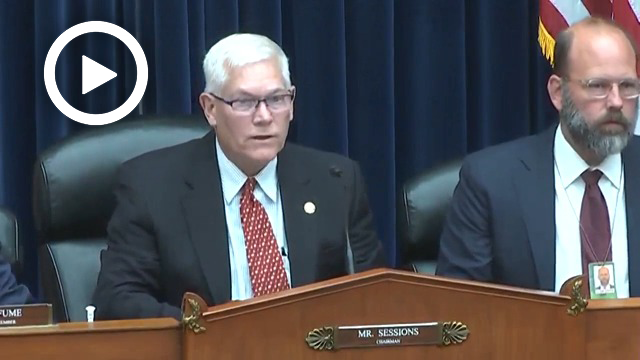Sessions Opens Hearing on Tracking Progress in Improving DOD’s Financial Practices
WASHINGTON—Subcommittee on Government Operations and the Federal Workforce Chairman Pete Sessions (R-Texas) today opened a hearing titled “Tracking Progress: Examining the Department of Defense’s Financial Management Practices” by emphasizing the importance of improving financial transparency at the Department of Defense (DOD) to instill confidence in DOD’s ability to protect America’s interests at home and abroad.
Below are Subcommittee Chairman Sessions’ opening remarks as prepared for delivery.
Welcome to today’s hearing on tracking progress on DOD’s efforts to enhance their financial management practices.
I’d like to thank our witnesses for testifying today on this important topic.
Financial transparency of the military is critical. To remain confident in DOD’s ability to protect America’s interests at home and abroad we need to be able to properly monitor their financial performance.
In fiscal year 2023, DOD received just over $850 billion dollars—half of federal discretionary funding. Also, during the same year, they reported $3.8 trillion in assets—a whopping 70 percent of the federal government’s assets.
Last year, we held a hearing asking basic questions—such as how tax dollars are spent, how existing assets are managed, and which business systems track the flow of funds through the Department. Today we still don’t have those answers.
DOD failed its six consecutive audit and holds the distinction of being the only federal agency that has never passed a comprehensive audit.
A financial statement audit isn’t just a paper exercise, it completes our picture of our military readiness. Without knowing where things stand, we cannot know where we need to improve.
As required by the fiscal year 2024 National Defense Authorization Act, DOD must achieve a clean audit opinion by December 28, 2028.
To meet this goal, DOD has established audit priorities and developed corrective action plans. However, GAO noted that DOD’s remediation plans were not sufficiently detailed to achieve its clean audit goals. Instead, they focused on high-level financial management priorities instead of the steps needed to achieve a clean audit.
GAO also found that DOD has consistently missed remediation deadlines established in the Department’s own financial roadmap.
Clearly, more work is needed for America’s military to achieve true financial accountability.
Together with Ranking Member Mfume, the Committee, with assistance from GAO, developed a DOD Financial Management Scorecard to track progress.
Today, with our first iteration of this scorecard, we want to provide a benchmark for where DOD is as they move towards their goal of achieving a clean audit opinion.
We can continue to hold hearings and ask DOD why they can’t pass their audits but we need to do more to track these efforts. Especially with the statutory deadline of December 2028 quickly approaching.
Today, in this hearing, I want to use this scorecard to discuss the basics:
What are the major problem areas that are preventing progress?
How is DOD trying to remediate it financial management shortcomings?
How is DOD learning and improving from each attempted audit?
What can Congress and the accountability committee do to ensure DOD is moving in the right direction?
We owe it to the American taxpayers to answer these questions
We are please to have a distinguished panel of officials deeply committed to making progress on these efforts
Tom Steffens, Senior Assistant to the Comptroller of the U.S. Department of Defense
Brett Mansfield, Deputy Inspector General for Audit at the U.S. Department of Defense Office of Inspector General, and
Asif Khan, Director of Financial Management Assurance at the U.S. Government Accountability Office.
Hopefully today’s conversation can help answer these questions and provide a good path forward for this Committee’s continued oversight of our military’s financial management.
Thank you again to today’s witnesses for speaking to these important issues.
And with that, I yield to the distinguished ranking member of the subcommittee, Mr. Mfume.
